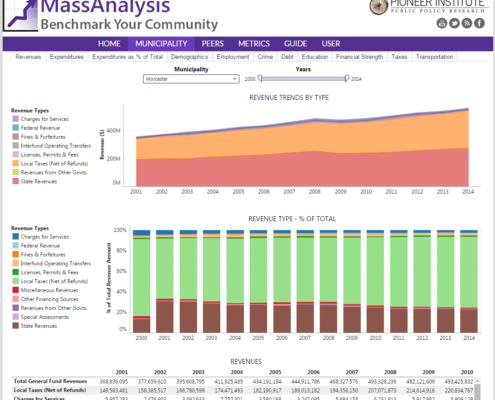Study Finds Massachusetts Lagging on Transparency of Public Official Statements of Financial Interest
A few simple changes would update system, improve transparency
Read coverage of this report in State House News Service.
BOSTON – Despite some recent progress, a new policy brief published by Pioneer Institute finds there is more to do if the Commonwealth is to make the Statements of Financial Interest (SFIs) that public officials file annually truly accessible to Massachusetts citizens.
“With just a few critical changes, Massachusetts could progress from maintaining one of the least transparent and least constituent-friendly financial disclosure regimes in the nation to becoming a national leader in the accessibility and usefulness of its public officials’ Statements of Financial Interest.” Said Mary Connaughton, co-author of “Outdated and Obfuscated: The State of Public Financial Disclosure in Massachusetts.”
All but three states require elected officials to submit public financial disclosures on an annual basis. Thirty-one states post the disclosures online for free and open viewing, but Massachusetts is not among them.
Connaughton and co-author Matthew Graves find that, while SFIs are public documents in Massachusetts, those who seek access to them must either visit the State Ethics Commission in person with a photo ID or upload a picture of the ID online so the commission can verify the requester’s identity.
Until recently, a requester had no choice but to visit the office of the State Ethics Commission. When the Public Inspection Module, which allows registered individuals to view SFIs online, was unveiled last year, more disclosures were viewed in a single day than in the previous three years.
One suggestion Graves and Connaughton offer to bring the Commonwealth’s financial disclosure regime into the mainstream is to eliminate the picture ID requirement. While photo IDs are not required to vote or register to vote, they must be provided for citizens to see elected officials’ SFIs.
The authors also recommend eliminating the requirement that filers be given the name of anyone requesting the public official’s SFI. The provision opens requesters to potential intimidation and has a chilling effect on SFI requests.
Finally, Massachusetts should update its SFI forms, which have not changed since the law went into effect in 1978. Since that time, mean household income has risen by 255 percent and home values have jumped 702 percent. The result is a form in which “$100,000+” is the top category listed for the value of a public official’s home. According to the authors, the simplest way to address the issue would be for the Legislature to give the State Ethics Commission discretion to adjust the categories as it sees fit.
About the Authors
Matthew F. Graves is a J.D. Candidate at Boston University School of Law. He previously worked in Governor Charlie Baker’s Legal Office as the Legal Assistant and Primary Records Access Officer. Prior to the Governor’s Office, he worked in New Hampshire politics. He holds a degree in Government from Dartmouth College.
Mary Z. Connaughton is Pioneer Institute’s Director of Government Transparency and Director of Finance and Administration. Previously, she served on the boards of the former Massachusetts Turnpike Authority, the Massachusetts Commission on Judicial Conduct, and the Commonwealth Corporation. She was Chief Financial Officer of the Massachusetts State Lottery and held positions in the State Treasurer’s Office. She earned an M.B.A. from Assumption College, and holds degrees in accounting and English from the University of Massachusetts at Amherst.
About Pioneer
Pioneer Institute is an independent, non-partisan, privately funded research organization that seeks to improve the quality of life in Massachusetts through civic discourse and intellectually rigorous, data-driven public policy solutions based on free market principles, individual liberty and responsibility, and the ideal of effective, limited and accountable government.
Related Posts:















